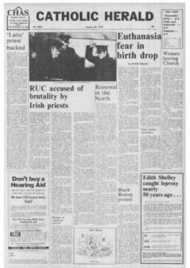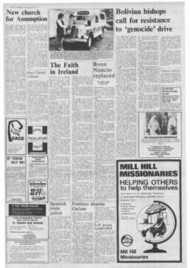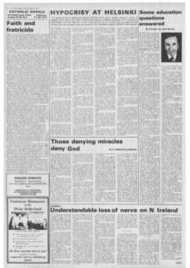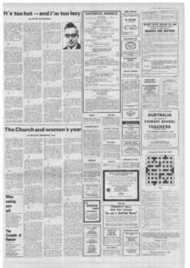Page 7, 22nd August 1975
Page 7
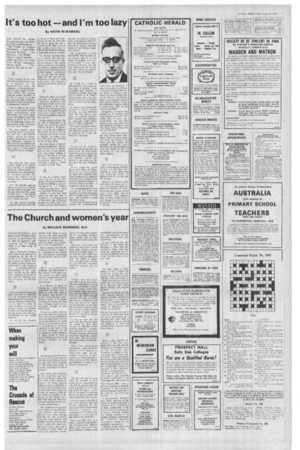
Report an error
Noticed an error on this page?If you've noticed an error in this article please click here to report it.
Tags
Share
Related articles
George Ward Replies To Mp On Grunwick
The Interaction Of All Creation
Plain As A Pikestaff
Let Them Smoke Cigars
First Thoughts
It's too hot --and I'm too lazy
By KEVIN McNAMARA
YOU KNOW the clichés because you have read them in all the travel brochures "The Cradle of English Christianity ... haunt of the Picts and the Scots . . . the Romance of the Border . . . miles of unspoilt beaches ... castles guarding the realm from foreign marauders. natural beauty . . . " Fortunately they are all true.
no
Every summer for the past four years we have spent a week in a caravan on the Northumbrian coast. No telephone, no newspapers and only the main London to Edinburgh railway line running along the eastern boundary of the site to remind us on the hour, day and night, of politics, -.financial deficits, the problems of nationalised industries
I was to write to you of the places we had visited, of their early associations with Christianity, the Saxon Saints Aidan and Cuthbert (were they Saxons or Irish?), but it is too hot. In Seahouses a note in a shop window reads "Too warm. Too lazy. Gone Fishing."
The main camping equipment shop, where I was going to buy those items I had failed to replace during the winter, carries a similar sign in its window, displaying a supreme indifference for materialistic considerations and the chance of a quick profit, it stated simply: "Closed for Summer Holidays."
The relatively new, small Catholic chapel of St Aidan's has a number of remarkable attributes. Remarkable not because they are extraordinary for ordinary mortals, but because they display a use of common sense, unusual among the clergy.
First, the weekday morning Mass is at 10 o'clock. It means that the children can fight over who pets what from the cereals "Variety Pack" "He had the Frosties yesterday?' and "I'm a girl, I should pick first,"
The fight quelled, breakfast completed, the picnic prepared, we can go to Mass and Communion, be out by 1030 and
still find a good spot on a secluded beach. Mass times at other seaside resorts seem to coincide with breakfast, making
it impossible to go as a family. The Monday morning Mass was a surprise. We had been married on St Dominic's Day and we arrived at the church, taking up one pew and spilling into another, to discover that St Dominic had been replaced by
St John Vianney -a victory for-the seculars over the regular clergy. Not that we really objected hut we would have liked to have been told, I suppose I should get one of the new Daily Missals.
During the Mass the English
words had, on our anniversary, a particular significance. the meaning of which I would never have grasped in the Latin: "Father, hear the prayers of the family you have gathered here before you, in mercy and love
unite all your children wherever they may be."
On the notice-board was a list not only of Mass-times at St Aidan's but also of the nearest Catholic chapel (at Hingham) and a note that an additional Mass would be said at 11.45 am on Sundays at St Paul's Church of England. St Aidan's seats only about O. It was well filled for the weekday Mass.
The local Church of England had been kindly put at the disposal of Catholics on Sunday, and we went, It was packed, with many people standing at
the rear or the church. Arriving we had a somewhat dis
concerting experience of receiving a gracious "Good morning" from the Vicar.
It was an occasion nearly ruined by one of the tribe saying: "If they are lending it to us and we're filling it, why can't they give it ha ?" A hearty "Good morning Vicar" killed the remainder of the word. Really it is too bad. Eight
years old and not able to recognise in ecclesiastical
architecture the difference between St Paul's early 19th century and pre-Reformation churches. No doubt his failure is due to the abolition of the 11plus, the introduction of comprehensive schools and the supincss of the Catholic education Council!
This co-operation in Faith was further demonstrated by an unusual signpost in the village of Ellingham, where two of the trinity of road signs pointed to churches, one sign read: "Main road. RC Church first right," and in the opposite
dirt:clime "C of E Church."
It would be a help to holidaymakers, particularly in these days or touring, youth hostelling and camping, if
churches in holiday areas had similar notices to St Aidan's telling people where the next Catholic Church in each direction is situated and the Masstimes.
In remote areas such as the Yorkshire Dales, where churches are long distances apart and four diocese con verge, this would be a positive boon. Perhaps some enterpris ing newspaper could publish such a holiday supplement.
Of course I should have been carrying around a directory of each and every diocese but they are generally out of date and bulky for a knapsack.
Finally at St Aidan's, Seahouses, the church door was always open. On Holy Island, despite the plaintive chords of a guitar coming from inside, the new Catholic church was locked. A tatty notice on the door gave the time of Sunday Mass.
So we visited the parish church of St Mary the Virgin.
There were no candles to be lit but there was a beautiful altar carpet worked by the women of the parish from a design taken from the Lindisfarne Gospels. It took four years to complete a magnificent piece of work.
On the Baptismal Font was a carving of the head and shoulders of a child with a dove about to alight upon it. It was heavy and awkward; a good idea gone wrong.
In this most northern part of England, the Northumberland coast, there arc reminders of many lost empires from Roman Ii) our own. In Craster Harbour. the home of kippers made famous by Edward Heath during the Berwick By-Election. there is a memorial to Captain John Charles Palleine Craster, late of the 46th Punjabise, killed in action June, 1904, on the Tibetan Expedition.
The harbour was built to his memory by his brothers and sisters. Killed on the roof of the world over 70 years ago, remembered then, but who knows or cares now about this odd reminder of Empire in this little sleepy fishing village near the Scots Border?
Before any of these empires the sand dunes were there. Below. where the great castles now stand, the eternal waves broke upon the beaches and pounded against the rocks. Doubtless our ancient forbears took their children to play on the beach, sit. in the sun and make sandpies.
Here I am on the hot sand, under the burning sun, dabbling my feet in a cold North Sea, meaning to write about this most beautiful corner or England, but it's too hot and I'm too ivy'. .
Owing to the silliness of this particularly silly season. the article that appeared under the byline of Norman Si JohnStevas last week, was in fact by that other MP, Kevin McNamara, The Editor does not know which way to look, though it is reported that he is giving his feet a good deal of attention.
blog comments powered by Disqus


